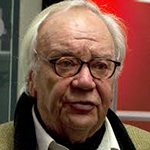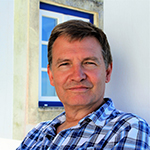City you think you know
from a collage by Rango Bohne
A staircase: if you cared to know, where and how
it continues … two window frames stand in the way, and
they are essential to the whole composition.
From a city you think you know, or at least,
you’ve made use of as an image. Simply the name
would serve as a reminder of a story that speaks of
the centre, the establishment, melting away
on all sides. In the background, façades that are
perhaps only pasted on, glued onto an interior
that was, in turn, the backdrop to a soliloquy
… we are speculating; we switch off the radio
and inspect the vertical lines of windows,
from bottom to top, where a vacant, grey surface
begins. The next question, and it’s what comes
now in the running-order … it always gets faster
and faster, even if the staircase is still the staircase.
So, from the top. The window frames stand around,
and if nothing else happens there remains a stock
of simulations. Without instruction we do not
act, and then there must still be time, long enough,
to stand up on the step, on the flight of stairs.
Autumn story
A drawing, or perhaps just a scribble … I had
tried to give the old, drooping pear tree
some kind of support. But the bracing
of pencil strokes failed. Now, for a few days,
the fog has prevailed here, and today
it has made it impossible to see anything
at all. It has been like this for years,
structures, frosts, owls in flight, September wars.
Translator’s Note:
Given his 1000 page Collected Poems (Suhrkamp, 2022), it’s remarkable that Jürgen Becker’s work has been so little translated into English. The translator’s difficulties tend not to lie not in his word choices (Becker plainly describes, he states), but, to some degree, in his cultural references, and, primarily, in dealing with his style of montage-composition, his commitment to ‘the apparently incidental’. The poem ‘City you think you know’ is particularly interesting from this point of view as it draws on pictorial art by Rango Bohne (who was Becker’s wife). In her practice, he found a blending or combinative technique at work which he (has said) he often practiced in his writing to produce a collage-like linking of disparate, contrasting elements, such as motifs of landscapes, architectural structures, window views, groups of figures. As a result, Becker’s porous verse contains multitudes: perspectives, voices, inner and outer events, photos, maps, postcards, news, weather reports. In the act of translation, it can be hard to flex (as it were), to permit these into English, and I have had to learn to trust Becker’s arrangements of them into long, semi-colon linked passages, utterly remote from conventional ‘lyric’. Though perhaps not such a characteristic work (in its brevity!) but in a phrase from these poems that captures something essential about Becker’s oeuvre ‘Autumn story’ concludes with, ‘It has been like this for years, / structures, frosts, owls in flight, September wars.’ As to his life, Becker grew up in Thuringia, Germany, which, following World War II, found itself in the Soviet occupation zone, later the GDR. However, by that time, the family had re-located to (then) West Germany, and, after the reunification of the two Germanies in 1990, he would often return to these remembered childhood landscapes and write about them. These two poems were published in his 1993 collection, Foxtrot in the Erfurt Stadium.

Jürgen Becker was born in Cologne, Germany, in 1932 and died there in 2024. He is the author of over thirty books—including drama, fiction, and poetry—all published by Suhrkamp, Germany’s premier publisher. He has won numerous prizes, including the Heinrich Böll Prize, the Uwe Johnson Prize, the Hermann Lenz Prize, and the Georg Büchner Prize, the highest honour a German-language author can receive.

Martyn Crucefix is a poet and translator. He is the author of seven original collections of poetry, most recently Between a Drowning Man (Salt, 2023) and Cargo of Limbs (Hercules Editions, 2019). His translations of Peter Huchel’s These Numbered Days (Shearsman, 2019) won the Schlegel-Tieck Translation Prize in 2020. His translations of essays by Lutz Seiler, In Case of Loss, is published by And Other Stories (2023). His translations of Rilke selected poems, Change Your Life, is published by Pushkin Press (2024). Blog and website at martyncrucefix.com.

 BACK TO ISSUE
BACK TO ISSUE